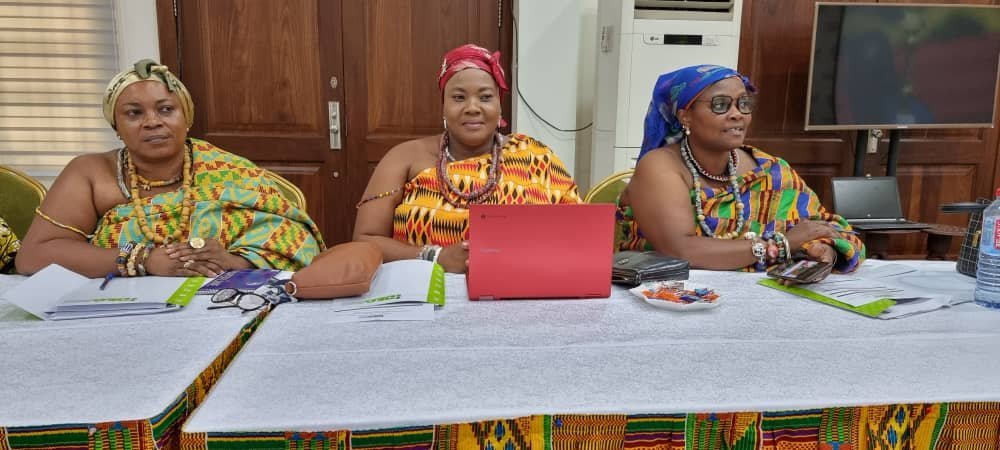Gender
Beyond the cross: The role of women in Easter story

Easter is here again and Christians all over the world are observing the death and resurrection of Jesus Christ, as described in the New Testament.
It also marks the end of the Lent season and is also a time of joy and celebration for many Christians worldwide.
It is therefore not surprising to see Christians organise conventions, crusades and picnics to commemorate the special occasion.
On Good Friday which is expected to be commemorated tomorrow, a section of Christians would wear black to signify the crucifixion of Jesus Christ.
Predictably, it would be all white on Sunday which is the resurrection to signify victory over death.
In this article, The Spectator would look at the role women played in the entire story about the death, burial and resurrection of Jesus Christ.
During the ministry of Jesus Christ, women such as Mary Magdalene, Mary, Martha, Joanna and Sussana played significant roles. They were devoted followers, witnesses, and provided financial support to Him, during his ministry.
At the cross, several women were present during Jesus’ crucifixion, including Mary Magdalene, Mary the mother of James, Salome, and Mary, the mother of Jesus.
Matthew 27:56 mentions that “many women were there beholding afar off, which followed Jesus from Galilee, ministering unto him.” Luke 23:27-31 and Mark 15:40-41 also refer to ‘many other women’ being present.
Women played significant roles in the events surrounding Jesus’ death, burial, and resurrection.
In ancient Jewish culture, women’s testimony was often viewed with skepticism or dismissed altogether. A Jewish historian Josephus noted that women’s testimony was not admissible due to perceived flaws in their character.
This societal bias is evident in the Gospel accounts, where women’s roles as witnesses to the resurrection of Jesus were crucial, yet potentially problematic given the cultural context.
The resurrection account is built on the testimony of women and it best explains the central role of women in the Easter story.
In each of the four gospels of the Bible, (Matthew, Mark, Luke and, John), the women- Mary, Mary Magdalene, were the first to see the risen Jesus. It is their testimony that sends Peter and John to the empty tomb.
The role of women in the death and resurrection of Jesus Christ cannot be downplayed, bringing to light how women can be agents of change and transformation in the face of adversity.
Again, the role of these women in the events surrounding the suffering, death and resurrection is a reminder of the contributions that women can make to the life of the church and recognise the important roles women play in various aspects of life including politics, education and business.
The role of women
In Mark 14: 1-9, it was a woman who anointed the head of Jesus in preparation for his burial. In Matthew 27: 19, a woman urged her husband (Pontius Pilate) to stand against the power of the mob and spare an innocent man’s life.
Again, women were the ones that stood at the foot of the cross as Jesus breathed his last in Matthew 28:1, Mark 16:1-6 and Luke 23:55-56 where women were the first to arrive at the tomb to anoint the body of Jesus.
Also they were the first to be entrusted with taking the good news of Christ’s resurrection to the disciples and were the first to witness the resurrection as captured in Matt 28: 18 -20.
Significance
According to Christianity.com, the role of these women speaks volumes of how much God loved, trusted and rewarded the women. It also speaks to the many ways God is willing, eager and able to use both men and women to advance his Kingdom.
In April 2023, a research paper on ‘The role of women in the events surrounding the suffering, death, and resurrection of Jesus Christ,’ states that women can be agents of change in a society that oppresses and marginalises them.
It said the fact that women played a key role in the events surrounding the suffering, death, and resurrection of Jesus was an example of how they can effect change and transformation.
“The role of women in the events surrounding the suffering, death, and resurrection of Jesus Christ can have significant implications for national development.
One way in which this can be done is by recognisng and valuing the contributions that women make to society,” it said.
The paper said just as Jesus valued and respected women in his ministry, it is important for society to recognise the important role that women play in all areas of life, including politics, business, and education, adding that this can be achieved through policies that promote gender equality, equal opportunities, and the protection of women’s rights.
Just as the women in the Gospels were leaders and co-workers in the early Christian community, women today have the potential to be leaders in their communities, contributing to the growth and development of their nations.
Providing education and training opportunities for women can help them develop their skills and abilities, and empower them to take on leadership roles in society.
It added that the role of women in the events surrounding the Easter story provides important lessons that can be applied to national development by recognising and valuing the contributions of women, promoting their education and empowerment, and encouraging their participation in all areas of life.
Society can work towards promoting gender equality and uplifting women in all areas of society. This is a powerful reminder that God can use even the most marginalised and overlooked members of society to bring about his purposes.
By Esinam Jemima Kuatsinu
Gender
Awareness: First weapon against breast cancer

October is globally observed as Breast Cancer Awareness Month -a period dedicated to raising awareness, honouring millions of lives touched by the disease, and reaffirming the worldwide commitment to equitable access to care and improved survival for all.
This annual observance, marked in countries across the globe, serves as a rallying point to increase attention and support for early diagnosis, treatment, and survivorship. The 2025 theme, “Every story is unique, every journey matters,” places a spotlight on the deeply personal experiences of breast cancer survivors and patients. It underscores the diversity of their struggles while reinforcing the urgent need for compassionate, timely, and quality care regardless of geography, income, or background.
Behind every diagnosis lies not only a medical condition but also a story-one filled with courage, resilience, and hope. These stories extend beyond individuals, shaping the experiences of their families, friends, and entire communities.
Breast cancer continues to be the most diagnosed cancer among women worldwide. According to the World Health Organisation (WHO), approximately 2.3 million women were diagnosed in 2022, and about 670,000 died from the disease.
“These are not just numbers but mothers, sisters, daughters, and friends who deserve hope and dignity,” the WHO emphasises.
Survival rates, however, differ starkly across regions. While the five-year survival rate exceeds 90 per cent in high-income countries, it drops to 66 per cent in India and 40 per cent in South Africa. The reasons are clear: unequal access to early detection, timely diagnosis, and effective treatment.
If current trends remain unchecked, both incidence and mortality are projected to rise by 40 per cent by 2050. To address this, the WHO established the Global Breast Cancer Initiative in 2021, working with partners to strengthen health systems and reduce preventable deaths worldwide.
The situation in Ghana
In Ghana, breast cancer poses a particularly pressing public health concern. It is the most common cancer among women, accounting for about 15 per cent of all malignancies.
Studies reveal a troubling trend: almost 70 per cent of women are diagnosed at advanced stages, where treatment options are limited and survival rates much lower. In 2012, nearly half of Ghanaian women diagnosed with breast cancer lost their lives to the disease.
These statistics point to late presentation, cultural stigma, and limited access to screening facilities as some of the key factors fuelling high mortality.
Experts warn that unless more women come forward for early screening and timely treatment, these figures may remain stubbornly high.
Executive Secretary of the Breast Cancer Society of Ghana (BCSG), Mrs Georgina Kumah-Dzagah, said the numbers are not just statistics, they represent lived experiences. A survivor herself, she knows first-hand the difference early detection and treatment can make.
“My journey could have ended differently if I had ignored the early signs,” she reflected. “That is why the theme ‘Catch it early, treat it right, survive it’ is not just a slogan to me. It is a lifeline that can save countless women.”
Mrs Kumah-Dzagah believes awareness is the first weapon in the fight. She stresses that women must be proactive, know their bodies, and act quickly when something feels unusual.
“A lump, nipple discharge, or changes in the skin should never be ignored or treated with fear and silence,” she explained. “Hospitals and screening centres are there to help us, not to harm us. Early detection gives the best chance for a cure.”
The Executive Secretary also raised concern about the role of misinformation and reliance on untested remedies saying, too often, delays and misplaced trust in alternative cures cost lives.
“Treating it right means trusting science and trained professionals,” she stressed. “Modern treatment -whether surgery, chemotherapy, radiotherapy, or hormone therapy -may be tough, but it saves lives. I went through these treatments myself, and though the journey was not easy, I am living proof that treatment works when given at the right time.”
Her message resonates strongly in a society where cultural beliefs sometimes discourage women from seeking hospital care, and myths about breast cancer fuel stigma.
For Mrs Kumah-Dzagah, survival is not simply about conquering the disease. It is also about reclaiming life, hope, and purpose.
“Breast cancer is not a death sentence,” she affirmed. “Survivorship comes with challenges, but it also brings strength. Today, I speak not just for myself but for every woman still in the fight.”
A call for collective action
Mrs Kumah-Dzagah believes that breaking the silence and stigma around breast health is critical. She called on women, families, and communities to support open conversations and proactive health checks.
She said “let us be bold to check, quick to act, and committed to supporting each other. If we catch it early and treat it right, we will surely survive it.”
She said, BCSG continues to lead nationwide campaigns to create awareness, encourage screening, and support patients and survivors.
Through advocacy and education, the organisation, she said reminds women that vigilance, timely treatment, and community support can turn the tide against breast cancer.
By Esinam Jemima Kuatsinu
Join our WhatsApp Channel now!
https://whatsapp.com/channel/0029VbBElzjInlqHhl1aTU27
Gender
Trained but jobless …the human cost of Ghana’s skills mismatch

ALONG the busy corridors of the George Walker Bush highway, in Accra, 26-year old Nana Akua Afriyie arranges her beautiful sewn African print dresses on mannequins in front of her shop, hoping to attract buyers.
She trained in fashion design at a Technical and Vocational Education and Training (TVET) school in the Ashanti Region and graduated with high expectations. But three years on, she admits the journey has been tough.
“Everywhere I go, they tell me the same thing -they already have enough fashion designers,” Akua said with a wry smile.
“I wish I had studied something like agro-processing or Information Communication Technology (ICT), because that is where the jobs seem to be.”
Her story is not unique. Across Ghana, TVET graduates are struggling to find work, even as employers complain about difficulties in hiring people with the right skills.
This paradox lies at the heart of a new study commissioned by United Nations Children’s Fund (UNICEF) Ghana in partnership with the Government of Ghana, which has revealed deep structural gaps in the TVET system.
Oversupply and
shortages
The study, conducted across 57 pre-tertiary public and private TVET institutions, found a sharp mismatch between the skills offered in schools and the skills demanded on the labour market.
Only one out of the 57 schools offers training in agriculture which is a dominant driver of Ghana economy. This is despite employers reporting a rising need for skilled workers in agro-processing and agricultural technology.
The situation in ICT is only slightly better. Although the digital economy is growing rapidly, just four TVET institutions provide ICT-related training.
By contrast, trades like fashion design and garment-making are oversupplied. Almost every TVET institution offers them, leading to a glut of graduates competing in a saturated field.
Kwame Bediako, who runs a medium-sized agro-processing company in Ejisu, says the imbalance is hurting businesses. “We need young people who understand modern farming, post-harvest handling, and agro-processing.
But the schools are not training them. Instead, every year, we see hundreds of fashion and hairdressing graduates with no jobs waiting for them,” he told this paper.
Employment gap
Beyond the mismatch of trades, the study also uncovered a “perception gap” between employers and graduates.
Employers surveyed consistently reported that TVET graduates lacked adequate practical exposure and soft skills such as teamwork, communication, and problem-solving. Yet when students were interviewed, many expressed confidence in their preparedness for the job market.
“It’s like we are speaking two different languages,” said a construction contractor in Kumasi who took part in the survey.
“We advertise for masons or welders, and applicants come with certificates but cannot deliver basic tasks on-site. Meanwhile, they believe they are fully qualified. It is frustrating for everyone.”
This gap highlights a deeper issue: the way TVET outcomes are measured.
While many institutions prioritise exams and certification, employers value real-world performance, adaptability, and reliability – qualities directly tied to the targets of Sustainable Development Goal (SDG) eight which seeks to achieve decent work and economic growth.
Infrastructure
under strain
The introduction of free TVET education in Ghana has been hailed as a bold step to expand access and empower more young people with employable skills. But the surge in enrollment has placed immense pressure on schools.
Workshops, classrooms, and training equipment are overstretched, making it difficult for instructors to deliver effective Competency-Based Training (CBT) – a method designed to give students practical, hands-on skills.
At one TVET school visited during the study, a single welding machine was being shared by more than 30 students, drastically limiting practice time.
“We are trying, but the resources are just not enough,” admitted an instructor who asked not to be named.
Interestingly, the study noted that private TVET institutions recorded higher CBT accreditation levels than their public counterparts, but both sectors face similar challenges of inadequate infrastructure and outdated equipment – a challenge that reflects the urgency of SDG nine: Industry, Innovation, and Infrastructure.
Ghana’s demographic
dividend at risk
With a youthful population, Ghana is one of several African countries projected to benefit from a demographic dividend – the economic growth that can result when a large share of the population is of working age.
But UNICEF warns that this opportunity may slip away if young people are not adequately prepared for the job market. High unemployment, job insecurity, and limited opportunities are already major concerns.
“TVET is a powerful pathway to equip young people with relevant skills,” the report stated. “But unless curricula, training, and infrastructure are aligned with industry needs, Ghana risks losing the benefits of its demographic advantage – and missing its commitments under SDG four: Quality Education.”
Workplace experience:
A partial fix
One of the ways schools have tried to bridge the skills gap is through Workplace Experience Learning (WEL) – placing students in companies for internships or apprenticeships.
While many employers support this, some expressed concerns about the risks involved. “It is costly to supervise students who come for training, and sometimes they slow down productivity,” said an ICT firm manager in Kumasi. “But we do it because we know the system needs it.”
Recommendations
and the way forward
The study made several recommendations to address the skills mismatch. Its suggested curriculum alignment. It called on schools to update curricula to reflect the skills industries need, especially in agriculture, ICT, and construction.
Also UNICEF urged schools to inculcate soft skills in TVET training, infrastructure investment and build stronger partnerships.
UNICEF called for a collective effort involving government, private sector, development partners, and communities to ensure that TVET fulfils its role as a driver of sustainable economic growth.
For Akua, the fashion graduate, the lack of opportunities has been discouraging. Yet she remains hopeful. “If I had the chance to retrain in ICT or food processing, I would do it. I don’t want to just sit at home,” she said.
Her words echo the aspirations of thousands of Ghanaian youth – ambitious, energetic, and eager to contribute, but often trapped by systemic shortcomings in education and training.
By Esinam Jemima Kuatsinu
Join our WhatsApp Channel now!
https://whatsapp.com/channel/0029VbBElzjInlqHhl1aTU27














